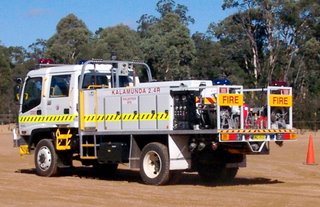I used to belong to a rural brigade near Toodyay, but I haven't been active since I left the area several years ago. I missed the sense of achievement and community involvement, so a few months ago I joined the Kalamunda brigade. We have training sessions every Sunday morning throughout the winter, in preparation for the summer fire season, and it has been a very worthwhile and enjoyable experience refreshing my skills and learning new ones.
Back in the distant past when I was at agricultural college, I got my truck licence in order to help with the grain carting on farms, and this later came in handy in the Julimar BFB, because it meant I could be what was officially (but rather rudely) called a "Heavy Driver". This was nothing to do with body weight, thank goodness, but referred to the "heavy tanker" as opposed to the "light tanker", which required just a car license.
The Kalamunda BFB has a much larger fleet of appliances (3 "heavies" and 3 "lights"), but also a much larger membership, so I did not expect to be needed as a driver, which suited me fine, as I have done no truck driving at all for a few years, and had only a little experience at Julimar in the previous five years. In other words, I had a license but minimal current skills, which was an extremely good reason not to get behind the wheel!
So it was with a mixture of excitement (20%) and terror (80%) that I found myself on an emergency vehicle driver training and assessment course last weekend. The Saturday theory session was so sobering that some of us decided we would rather walk to fires, pushing handcarts as in days of old. The lethal potential of several tons of fully-loaded, out-of control water tanker; the legal responsibility of the driver for all other crew members in the vehicle; the inexorable laws of physics opposing the efforts of the driver to effect an emergency stop; and the balance needed between safety and speed when responding to an emergency - these were aspects many of us had never properly considered in the excitement of "turning out" to a fire.
Consequently by the time it was my turn for the practical session on Sunday, the above percentages had shifted to nausea (10%) and terror (90%). There were two of us doing the "heavy tanker" course that morning, and I was mortified to discover, on the 40 minute drive to a disused airfield) that I was to be comprehensively shown up by an extremely competent and experienced fellow volunteer. The instructor sitting beside him remarked on several occasions that he felt a bit superfluous, and that there was nothing he needed to say. Oh dear, I thought. (Or silent words to that effect.)
The next few hours passed in an adrenaline-fuelled, dry-mouthed, and excessively apologetic haze, with a couple of "highlights" burned into my memory.
1. The emergency braking practice, particularly the short but heart-stopping skid - not an enjoyable manoeuvre in a big truck with 2000L of water sloshing wildly around a few feet behind your head. (Although we did avoid the experience of one team the day before, when the lid flew off the water tank during one emergency stop, and a tsunami broke over the cab.)
2. the instructor (ignoring my pleas) gave me the task of driving home through the Sunday afternoon traffic, complete with inattentive sightseers, weekend motorcyclists weaving enthusiastically and inexpertly across the lanes, arguing families on their way home from lunch at the inlaws, and death-defying kids on skateboards and bicycles.
I'm enormously relieved to report that I managed to deliver the truck and all its occupants back to the station undamaged, although I sincerely hope it is a very long while until I am required to drive one of those trucks under "lights and sirens" to an actual fire.



No comments:
Post a Comment